Hi Keith
I read this in the Herald, attributed to you:
“We are proud of the good peacekeeping and reconstruction work that our Provincial Reconstruction Team has done in Bamian Province, and we mourn the loss of one of its members.”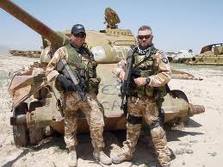
If those words are not misquoted, then I’m really angry at your misrepresentation.
What’s going on here?
You’ve read all the books and been constantly active in the anti imperialist movement for literally half a century. You must be much more acutely aware than most people that the so called Provincial Reconstruction Team that the New Zealand state sent to Afghanistan is not about peacekeeping, or reconstruction , or is, in any way, “ours”.
You must similarly know that unless someone belongs to or chooses to identify with the New Zealand ruling classes, or is a bought hack journalist, or has not had access to the most rudimentary understanding of class politics, that: “our Provincial Reconstruction Team” is not based in Afghanistan for peacekeeping, good or otherwise.
Death in war is an understandable trigger for human emotions. So lets get the whole picture here. How many Afghanistan people have been killed by New Zealand invaders of their country? When do we mourn and how do we begin to try and make amends?
People die every day in the course of their calling. The NZ army officer killed by Afghanistan people trying to evict invaders from their land is the first invading New Zealand trooper to die there since 2003. How many industrial deaths have there been in New Zealand since that time? How many flags were lowered, how many media voices theatrically quavered and how many Prime ministers broke routine for those working class victims of the class war?
Let the ruling classes do their barbarous inhuman dirty work alone and unaided.
Our little time on this earth has more urgent and honorable calls on it; to revive the antimperialist antiwar movement in this country.
Don Franks
New WP pamphlet on Afghanistan
New Zealand’s involvement in the occupation of Afghanistan has been commonly perceived as a humanitarian role. John Edmundson demolishes that myth and looks at what the occupation is really about.
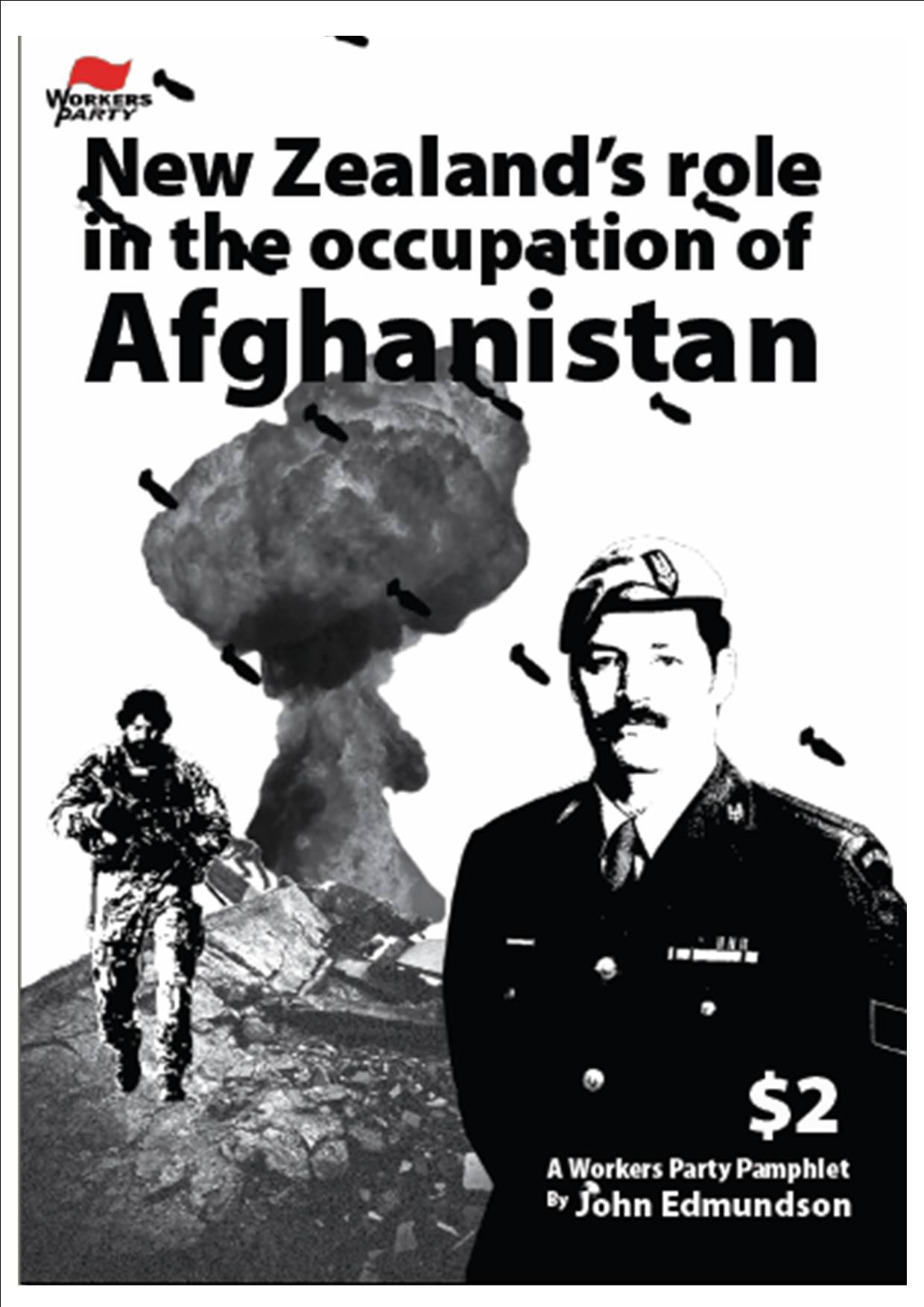 The Situation so far
The Situation so far
On 10 August 2009, Prime Minister John Key announced that the SAS (Special Air Service) would return to Afghanistan. This announcement had been predicted for some time so came as no surprise. The troops are being deployed in three rotations over 18 months and the full deployment involves 70 soldiers over that time period. At the same time, over that 18 months the NZ Army’s Provincial Reconstruction Team – NZ’s major commitment to the war – are being gradually reduced and eventually withdrawn, their work to be replaced by civilian work on agriculture, health and education. But the SAS deployment may in fact last much longer. The war in Afghanistan is going badly for the US -led coalition and few military people or civilian analysts are prepared to go public with an estimate of how much longer it could go on. A time frame as short as 18 months seems unlikely and if the war continues for years, there will be further requests for extensions to the troop commitment. With the Obama administration massively expanding the war effort, not just through increased troop numbers in Afghanistan, but an increasing involvement in Pakistan also, the war could well drag on for years. read more
It is 8 years since NZ troops joined the US led invasion of Afghanistan
The SPARK interviews long serving anti-imperialist activist and Workers Party secretary Daphna Whitmore
Spark: It’s been 8 years since New Zealand troops were sent to Afghanistan – why did the Labour-Alliance government send them in the first place?
It needs to be understood in the context of New Zealand’s involvement with US and British imperialism. New Zealand is a partner in this bloc, and Labour enthusiastically signed up to the so-called War on Terror. When it comes to involvement in military adventures Labour governments have been just as warmongering as National.
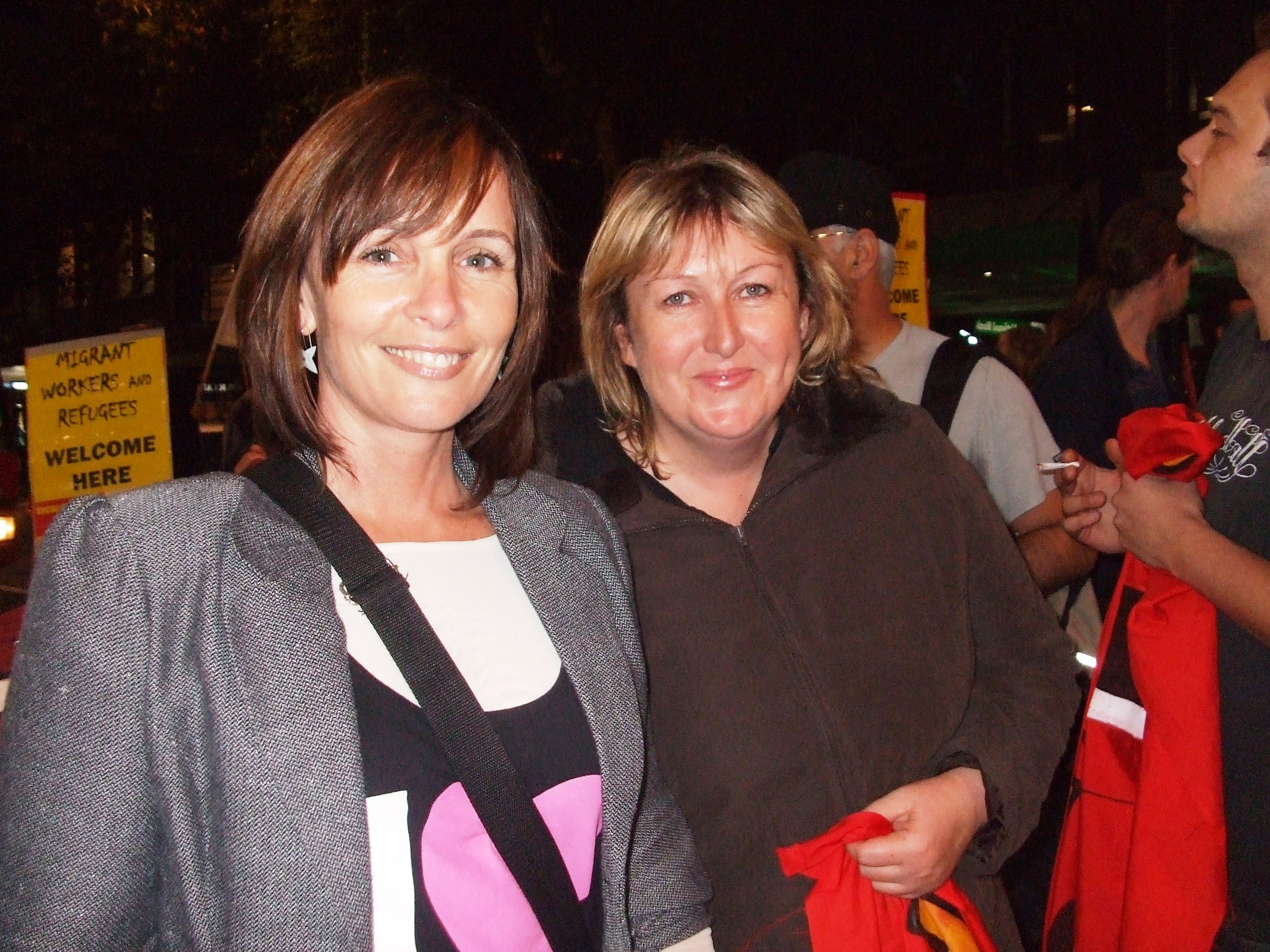
The Alliance Party split over the issue of support for the invasion of Afghanistan, with the majority of its members rejecting the war. It highlighted the problem of being in government with an outright capitalist party like Labour.
Spark: New Zealand companies aren’t trying to make major sales in Afghanistan – why all the risk and expense over such a long period of time?
In its last term the Labour government did scale back the involvement, recalling the SAS and sending instead “reconstruction” forces. This tended to obscure the reality – that these are military forces, participating in an occupation. It dressed it up to look like it was simply a humanitarian mission. Continue reading “It is 8 years since NZ troops joined the US led invasion of Afghanistan”
Stop the SAS return to Afghanistan
The picket coincides with the Court of Appeal hearing for an anti-war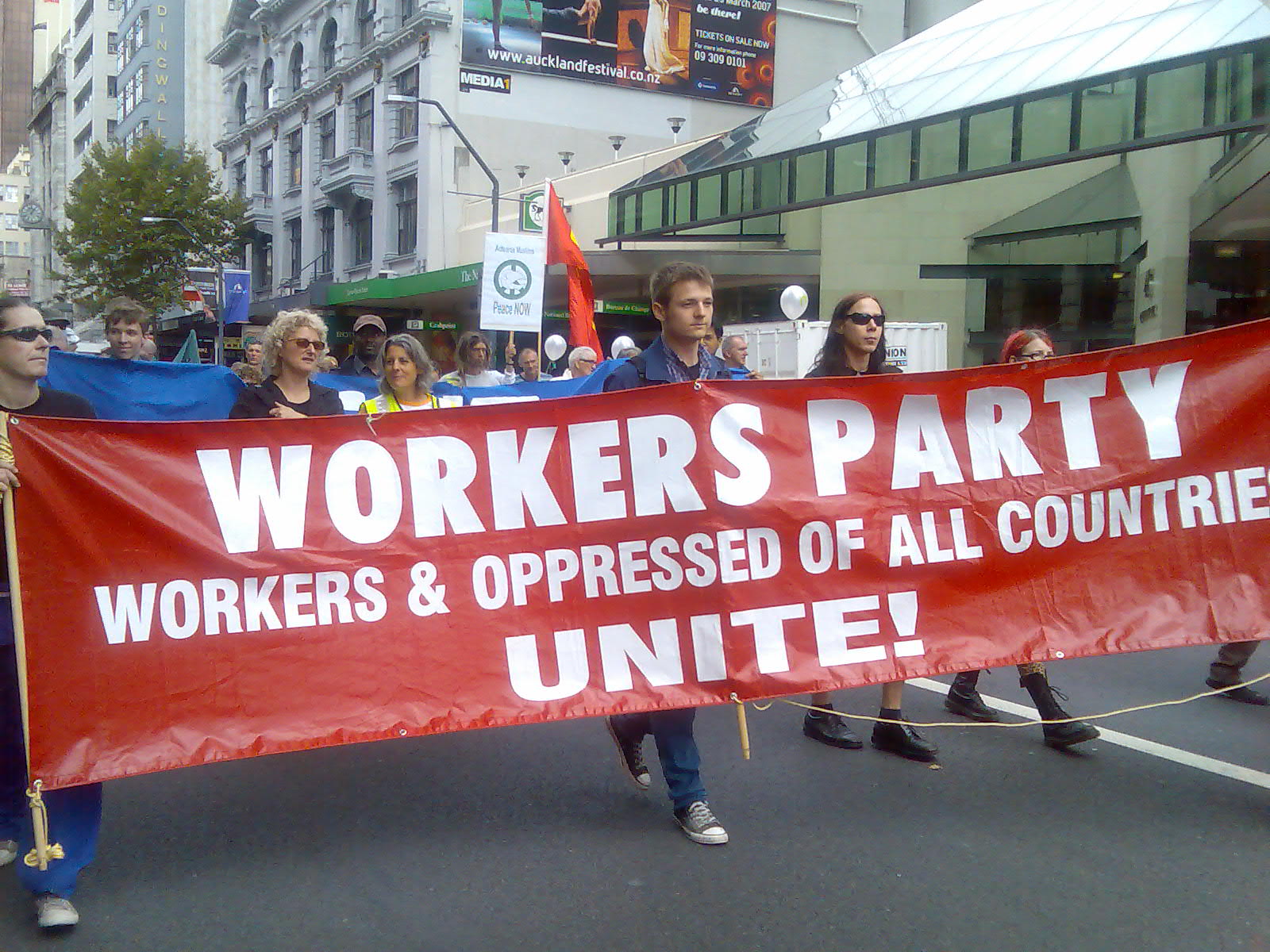 protester convicted of burning the NZ flag at anti-war protest in 2007. It also coincides with the government’s announcement of the return of the SAS to combat in Afghanistan. All welcome…and please pass it on…
protester convicted of burning the NZ flag at anti-war protest in 2007. It also coincides with the government’s announcement of the return of the SAS to combat in Afghanistan. All welcome…and please pass it on…
Organised by Peace Action Wellington
New Zealand government’s RSE scheme: “Brutal racist oppression”
By Don Franks
In a press release on 4 June 2009 the New Zealand Council of Trade Unions deplored the Government’s removal of the minimum wage protection for workers on the Recognised Seasonal Employer (RSE) scheme.
“There have been significant examples of unauthorised and unfair deductions from RSE workers’ pay even under the existing regulations,” said Wagstaff. “Relaxing the minimum wage rule will only result in more blatant exploitation of already vulnerable workers as unscrupulous employers shift costs onto them.”
“Allowing employers to make deductions which will reduce pay rates below the minimum of $12.50 per hour will significantly increase exploitation of RSE workers and undermine the credibility of the scheme”, said CTU Vice-President Richard Wagstaff.
Richard Wagstaff is dead right about the exploitation, but from a workers point of view, RSE has no credibility to be undermined.
The New Zealand Labour Department says:
“The RSE scheme facilitates the temporary entry of overseas workers, mainly from the Pacific, to plant, maintain, harvest and pack crops in the horticulture and viticulture industries to meet labour shortages in order to remain competitive with the rest of the world.” Continue reading “New Zealand government’s RSE scheme: “Brutal racist oppression””
Oppose the expulsion of Workers Party activists from Victoria University
Join the protests: Auckland Solidarity Protest for expelled anti-war Victoria Uni students Wednesday, May 27, 2009 12:00pm – 1:00pm Assemble in main quad, Auckland University
Wellington 12 -1pm on Friday, May 29, at Kelburn Parade (by Victoria University)
Students Alastair Reith, Joel Cosgrove and Ian Anderson have been expelled from Victoria University for burning the New Zealand flag. They did this in protest against New Zealand imperialism and New Zealand’s involvement in such imperialist ventures as Iraq, East Timor, the Solomon Islands, Tonga, the occupation of Afghanistan and elsewhere.
The students are not allowed to reenrol until next trimester, and are banned from sitting their exams. As a result they will fail all their courses, and as they are not being issued a refund they are essentially receiving a fine of several thousand dollars each.
The University is claiming that they were expelled for “health and safety” reasons. However this is clearly not the case. The flag was burned outside, in the rain, on the soaking wet smoker’s smokers’ deck outside the Mount Street Bar, and despite the false claims of the University the students had a bottle of water with them with which to put the fire out, and extinguished it themselves with water taken from inside the bar.
And if this was really about “health and safety”, why is Ian Anderson being expelled for filming the event? He had no direct role in burning the flag, and his only involvement was recording on camera what took place. Another student and Workers Party member, Marika Pratley, has been issued an official warning for simply being present on the deck while the flag was burned!
You don’t have to agree one hundred percent with the expelled student’s students’ politics, or with the act of burning the flag. But whatever way you look at it, this is an outrageous abuse of power by the University which sets a worrying precedent. This is an issue of freedom of speech, freedom of expression and the right to engage in political activity without fear of reprisal. If you support basic civil liberties and democratic rights, you should do everything you can to oppose the University’s decision and support Alastair, Joel and Ian being reinstated.
This coming Friday (the 29th), midday on Kelburn Parade, there is a protest being held against the expulsion of the students. If you think this is an over the top punitive action and support the right of student’s students’ to protest and take part in political activism in a free, open and democratic environment, you should come along and make your voice heard. Don’t let the University silence free speech!
The flag is symbolic, imperialism is real
Victoria university members of the Workers Party are facing charges of serious misconduct after burning the New Zealand flag. This leaflet explains the political background to the act.
Why burn the New Zealand flag?
The New Zealand flag is a symbol of imperialism. This is most obvious in its design, a tribute to the British Empire. This design was adopted after the Second Boer War, which devastated South Africa but resulted in a surge of Kiwi patriotism.
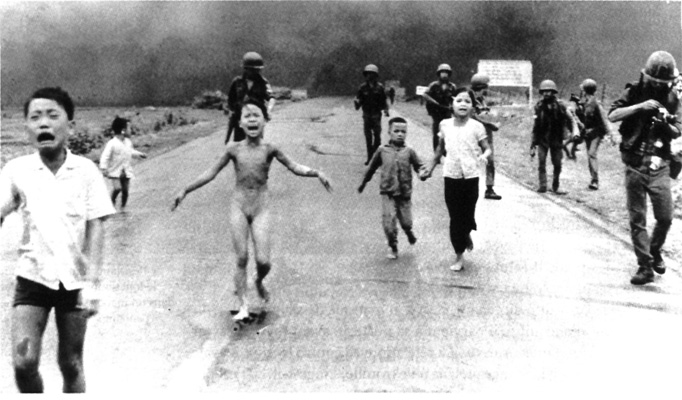
A simple re-design, while reflecting our emergence from the shadow of the British Empire, would not change the imperialist nature of the flag. It’s a tool of the ruling class, inseparably linked with militarism. From the Boer War through WWI and II, right through to armed involvement in Vietnam and Afghanistan, the flag has marked New Zealand’s presence. Flags mark military conquest, the subjugation of nations.
Flags and borders divide the working majority. ANZAC soldiers had more in common with their Turkish counterparts than with the bureaucrats who sent them to Gallipoli. The working majority has interests in common worldwide, including an end to imperial war. Ruling class nationalism is a barrier to recognising this.
What purpose does ANZAC day serve? Continue reading “The flag is symbolic, imperialism is real”
New Zealand’s Imperialist attitude toward Fiji
Byron Clark The Spark March 2009
In what John Key has described as sending “a strong message” Pacific Forum leaders voted earlier this year to suspend Fiji from the Forum unless the interim government sets an election date before May 1. The suspension means that Fiji cannot attend meetings between forum leaders, ministers or officials; it will also be excluded from benefiting from any regional initiatives run under the forum. Both Mr Key and forum chairman Toke Talagi said the decision was made by consensus, a surprising result given smaller Pacific nations were expected to vote against suspension, with Papua New Guinea Prime Minister Sir Michael Somare stating in his speech (released to the media before the meeting) “I am of the strong view that adopting an isolationist approach would be unhelpful.”
Fiji has already lost the benefits of one “regional initative” – participation in the seasonal work scheme allowing Pacific Islanders to work in New Zealand. Fiji was suspended from the scheme by the previous Labour government. So far this sanction has done little – if anything – to destabilise the military regime, instead it has effected ordinary Fijians. The Fiji based Coalition for Democracy and Peace, consisting of citizens’ groups and non-governmental organisations, had said that the poor are the ones most affected by sanctions imposed by New Zealand. Even when New Zealand sent aid to Fiji (via the Red Cross) in the wake of horrific floods, local Fijians said a better way for the New Zealand Government to help them would be to let them work in New Zealand, rather than give aid money. A petition was circulated asking Prime Minister John Key to issue special directions for one-year work visas for flood victims, and for an equivalent to the Pacific Access Category for Fijian citizens already in New Zealand. Continue reading “New Zealand’s Imperialist attitude toward Fiji”
Middle East politics
For indepth background analysis of the conflicts in the Middle East check out back issues from our MidEast Solidarity and Liberation journals:
MidEast Solidarity Spring 2001 mideast17
No to West’s war of terror
The West’s mass murder in Iraq
Israel’s war on the Palestinians
From Zionism to socialism
One year of the new intifada
Fear of fundamentalism
How the West made Bin Laden
Labour wages war on workers and poor
The problem is capitalism
Towards an anti-imperialist movement
MidEast Solidarity Autumn 2002 mideast22
Black Hawk Down actor speaks out
United Nations – friend or foe?
Peace is not good enough – against the invasion of Afghanistan
Palestine – solidarity urgently needed
Behind the wars on the Palestinians
Deir Yassin massacre
Who is in Palestine?
Liberation Spring 2002 liberation11
Liberating ideas and the movement we need to oppose the war on Iraq
Depleted uranium – another weapon of Western terror
How the West strangles the Middle East
One year on in Afghanistan
Represssion and resistance in Turkish jails
Armistice Day
Armistice Day in 2004 saw the Return of the Unknown Soldier
SQUIRE HELEN
(From The Spark, November 2004)
The Dominion Post (November 2004) reminded us that Prime Minister Helen Clark is also minister for arts, culture and heritage. Under that subhead, the paper carried an article by the multi-minister; “reflecting on our maturing sense of national identity”. To Helen Clark,” our maturing sense ” is a preoccupation with selectively remembered mass murder.
The first half of her article was a gushing sentimental rehash of the Unknown Warrior commemorations, concluding:
“More than 80 years elapsed from the time Prime Minister William Massey first explored the idea of a New Zealand Tomb of the Unknown Warrior to the day we welcomed home a young man whose life was cut short by war.”
Helen Clark writes as though the poor bastard had somehow been resurrected. No young man “was welcomed home” last November the 11th. The youth and prospects of the anonymous victim died the day imperialism butchered him in the mud of France.
The only thing Helen Clark welcomed in Wellington last Armistice day was a whitewash of capitalist history.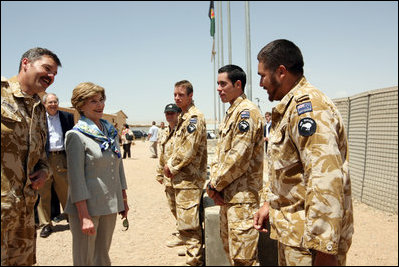
Right: Laura Bush greets NZ troops in Afghanistan June 2008
